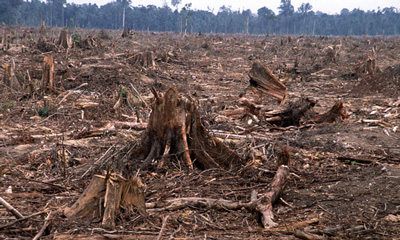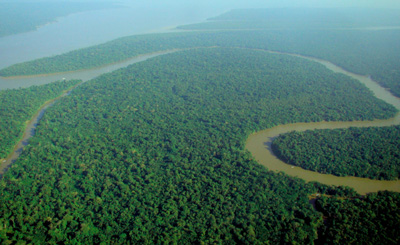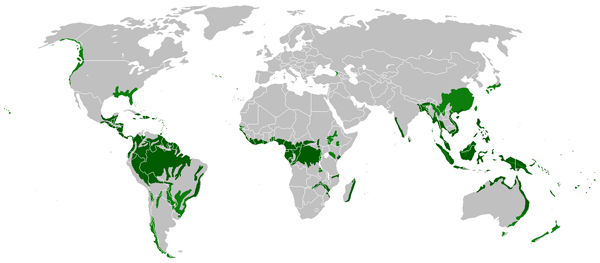From a reader:
Why Indonesia Is the Third Largest Emitter of Greenhouse Gases
May 26, 2014 | Revolution Newspaper | revcom.us
I have been watching the documentary on the climate crisis on Showtime, Years of Living Dangerously. Here, I'm not going to offer an overall evaluation of this series. But I wanted to write about something in the first segment that talks about deforestation and some of its effects.
The show exposes how the tropical forests in Indonesia are being deliberately burned to make way for palm oil plantations. And there is talk about how this is a major source of carbon emissions and pollution.
But what this discussion doesn't really get into is why this is happening. You don't learn about the underlying causes from that segment.

The rain forests in Indonesia--which are the world's third largest after the Amazon and Africa's Congo Basin--contain some of the highest levels of biological diversity on Earth. Above: A vast section of the rain forest on the Indonesian island of Sumatra that has been cut down to plant palm trees for palm oil production. In addition to creating huge amounts of carbon dioxide, obliterating rain forests threatens the existence of rare species such as the Sumatran tiger and the orangutans that live in Borneo—also a site of deforestation.
The special issue of Revolution on the environment, State of Emergency!, actually gets into what has been happening in Indonesia and why. Palm oil is used for commercial food production, cosmetic and chemical industries, and agrofuels. Palm oil production requires the development of huge plantation monocultures—no other crops, everything geared, with the huge application of agrochemicals, to this one commercial product—with no regard for nature.
How did this happen? Did the Indonesian people decide, "Gee, let's develop palm oil"? Is that what the indigenous people in the rain forest were campaigning for? No, these palm oil monocultures have been foisted on them by major imperialist agencies like the World Bank and the International Monetary Fund. Major transnational corporations like Unilever, Nestlé, and Proctor and Gamble, and banks from Switzerland, Britain, and the U.S., along with others, are directly financing and profiting from sales of products based on rain forest destruction.
Plantation-based palm oil agriculture got going in a really big way in Indonesia in the late 1960s. This was after the U.S. helped instigate a genocidal coup there in 1965 resulting in the deaths of up to one million people, including hundreds of thousands of communists and their sympathizers and supporters, and bringing to power the government of General Suharto. And then, after the Asian financial crisis of 1997, the World Bank and International Monetary Fund (IMF)—institutions dominated by the U.S.—insisted that Indonesia ramp up its production of palm oil and other export crops, like timber, to generate export revenues.
Today, Western Europe is "scaling down" certain carbon emissions, Third World governments are forced to pay off loans, and imperialist investors are profiting from biofuels. How? Through the "burning down" of rain forests for palm oil production, destroying the livelihoods of millions of small farmers, indigenous peoples, and other communities, and releasing huge amounts of carbon dioxide into the atmosphere.
Because of this, Indonesia is now the third largest emitter of greenhouse gases—after China and the U.S. And because of this, the Sumatran tiger and the orangutan of Borneo are facing extinction.
These are the workings of the criminal and irrational imperialist system.
Volunteers Needed... for revcom.us and Revolution
If you like this article, subscribe, donate to and sustain Revolution newspaper.


